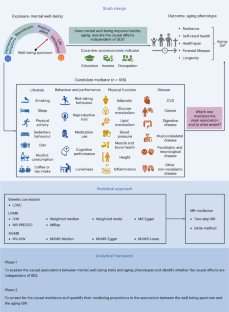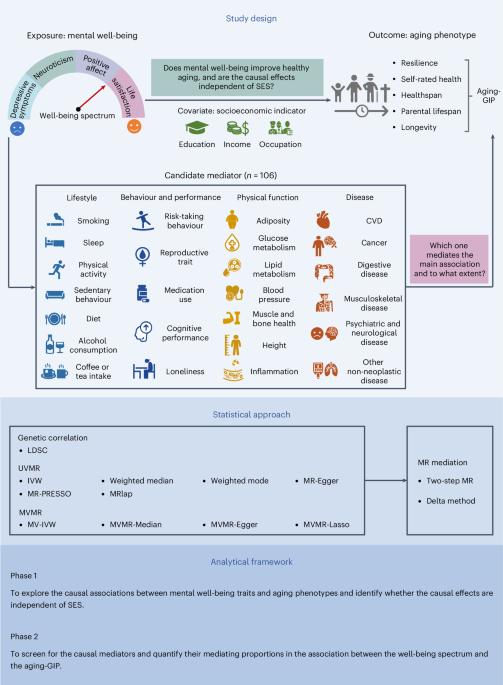孟德尔随机证据证明心理健康对健康老龄化的因果效应
IF 21.4
1区 心理学
Q1 MULTIDISCIPLINARY SCIENCES
引用次数: 0
摘要
心理健康与多种生活方式行为和疾病有关,是健康老龄化的基础。迄今为止,有关心理健康是否以及以何种模式影响健康老龄化和潜在中介途径的因果证据尚不清楚。应用幸福感谱系及其四个维度(包括生活满意度、积极情绪、神经质和抑郁症状)的遗传工具(n = 80,852 至 2,370,390 人)、我们进行了双样本孟德尔随机分析,以估计心理幸福感对衰老基因独立表型(衰老-GIP)的因果效应,衰老基因独立表型是一种稳健且具有代表性的衰老表型,其组成部分包括复原力、自评健康、健康寿命、父母寿命和长寿(n = 36,745 至 1,012,240)。分析根据收入、教育程度和职业进行了调整。所有数据均来自对欧洲后裔进行的最大规模的全基因组关联研究。较好的心理健康频谱(每高出一个 Z 分数)与较高的老龄化-GIP(不同模型中的 β [95% 置信区间 (CI)] 为 1.00 [0.82-1.18] 至 1.07 [0.91-1.24] 个标准差 (s.d.))有因果关系,与社会经济指标无关。抗逆力(β [95% CI] 从 0.97 [0.82-1.12] 到 1.04 [0.91-1.17] 标准差)、自评健康(0.61 [0.43-0.79] 到 0.76 [0.59-0.93]分)、健康范围(几率比[95% CI]从 1.23 [1.02-1.48] 到 1.35 [1.11-1.65])和父母寿命(1.77 [0.010-3.54] 到 2.95 [1.13-4.76] 年)。通过两步孟德尔随机调解分析,在 106 个候选因子中确定了 33 个作为福祉谱与衰老-GIP 之间的调解因子:主要是生活方式(如看电视和吸烟)、行为(如用药)和疾病(如心力衰竭、注意力缺陷多动障碍、中风、冠状动脉粥样硬化和缺血性心脏病),每个因子的调解比例均为 5%。这些发现强调了心理健康对促进健康老龄化的重要性,并为消除因心理健康状况不佳而导致的老龄化差异提供了预防目标。本文章由计算机程序翻译,如有差异,请以英文原文为准。


Mendelian randomization evidence for the causal effect of mental well-being on healthy aging
Mental well-being relates to multitudinous lifestyle behaviours and morbidities and underpins healthy aging. Thus far, causal evidence on whether and in what pattern mental well-being impacts healthy aging and the underlying mediating pathways is unknown. Applying genetic instruments of the well-being spectrum and its four dimensions including life satisfaction, positive affect, neuroticism and depressive symptoms (n = 80,852 to 2,370,390), we performed two-sample Mendelian randomization analyses to estimate the causal effect of mental well-being on the genetically independent phenotype of aging (aging-GIP), a robust and representative aging phenotype, and its components including resilience, self-rated health, healthspan, parental lifespan and longevity (n = 36,745 to 1,012,240). Analyses were adjusted for income, education and occupation. All the data were from the largest available genome-wide association studies in populations of European descent. Better mental well-being spectrum (each one Z-score higher) was causally associated with a higher aging-GIP (β [95% confidence interval (CI)] in different models ranging from 1.00 [0.82–1.18] to 1.07 [0.91–1.24] standard deviations (s.d.)) independent of socioeconomic indicators. Similar association patterns were seen for resilience (β [95% CI] ranging from 0.97 [0.82–1.12] to 1.04 [0.91–1.17] s.d.), self-rated health (0.61 [0.43–0.79] to 0.76 [0.59–0.93] points), healthspan (odds ratio [95% CI] ranging from 1.23 [1.02–1.48] to 1.35 [1.11–1.65]) and parental lifespan (1.77 [0.010–3.54] to 2.95 [1.13–4.76] years). Two-step Mendelian randomization mediation analyses identified 33 out of 106 candidates as mediators between the well-being spectrum and the aging-GIP: mainly lifestyles (for example, TV watching and smoking), behaviours (for example, medication use) and diseases (for example, heart failure, attention-deficit hyperactivity disorder, stroke, coronary atherosclerosis and ischaemic heart disease), each exhibiting a mediation proportion of >5%. These findings underscore the importance of mental well-being in promoting healthy aging and inform preventive targets for bridging aging disparities attributable to suboptimal mental health. Ye et al. find a positive causal effect of mental well-being on healthy aging, independent of socioeconomic status. This work underscores the imperative to prioritize mental well-being in health policies geared to fostering healthy aging.
求助全文
通过发布文献求助,成功后即可免费获取论文全文。
去求助
来源期刊

Nature Human Behaviour
Psychology-Social Psychology
CiteScore
36.80
自引率
1.00%
发文量
227
期刊介绍:
Nature Human Behaviour is a journal that focuses on publishing research of outstanding significance into any aspect of human behavior.The research can cover various areas such as psychological, biological, and social bases of human behavior.It also includes the study of origins, development, and disorders related to human behavior.The primary aim of the journal is to increase the visibility of research in the field and enhance its societal reach and impact.
 求助内容:
求助内容: 应助结果提醒方式:
应助结果提醒方式:


